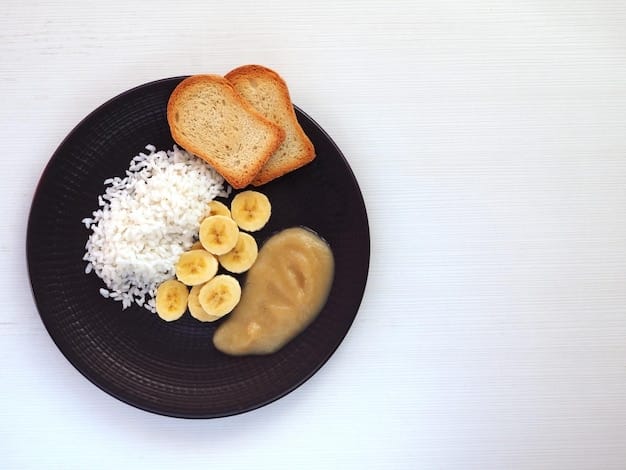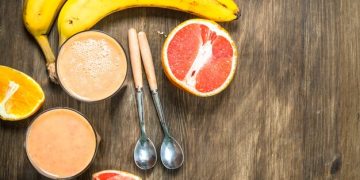Pre-Workout Nutrition: Fueling Your Training 60 Minutes Before

Optimal pre-workout nutrition, consumed roughly 60 minutes before training, involves a calculated balance of easily digestible carbohydrates and a modest amount of protein to maximize energy, enhance performance, and support recovery, without causing digestive discomfort during exercise.
For anyone serious about fitness, understanding Pre-Workout Nutrition: What to Eat 60 Minutes Before Training is not just about avoiding an empty stomach; it’s about strategically fueling your body for peak performance. The right nutrients at the right time can significantly impact your energy levels, endurance, strength, and even your recovery process. This isn’t about complex formulas or exotic ingredients, but rather about leveraging simple science to get the most out of every training session, ensuring your body has the readily available fuel it needs without feeling weighed down.
The Science Behind Pre-Workout Fueling
Understanding why certain nutrients are essential before a workout is the first step toward optimizing your performance. Your body relies on specific macronutrients – carbohydrates, proteins, and fats – for energy, muscle repair, and overall systemic function. When you exercise, especially intensely, these demands increase significantly. The timing of your meal is just as crucial as its composition, as it dictates how efficiently your body can convert food into usable energy.
Carbohydrates are your primary source of energy, particularly for high-intensity exercise. When digested, they break down into glucose, which is then stored as glycogen in your muscles and liver. During a workout, your body taps into these glycogen stores. If these stores are depleted, you’ll experience fatigue, decreased performance, and a feeling often referred to as “hitting the wall.”
Carbohydrates: The Energy Powerhouse
Consuming carbohydrates before a workout ensures your glycogen stores are topped up, providing a steady release of energy throughout your training session. However, not all carbohydrates are created equal for this purpose. The type of carbohydrate you choose plays a significant role in how quickly your body can access that energy and how long it lasts.
- 🏃♂️ Fast-Acting Carbs: These are simple carbohydrates that break down quickly, providing an immediate energy boost. Examples include fruits like bananas, berries, and refined grains. They are ideal when you need a rapid surge of glucose.
- 🐢 Slow-Releasing Carbs: Complex carbohydrates, such as oats, whole-wheat bread, and sweet potatoes, digest more slowly. They offer a sustained release of energy, preventing sharp blood sugar spikes and crashes, which can be beneficial for longer training sessions.
The goal is to provide enough available glucose without overwhelming your digestive system. A balanced approach often combines both types, leaning more towards easily digestible options when the workout is imminent.
Protein: For Muscle Protection and Repair
While carbohydrates are crucial for energy, a modest amount of protein before training can also offer significant benefits. Protein primarily supports muscle protein synthesis and minimizes muscle breakdown during intense exercise. During a workout, your muscles undergo stress, and protein helps to mitigate this, setting the stage for faster recovery and growth.
Consuming protein pre-workout can also help with satiety and prevent excessive muscle catabolism, especially if your training is prolonged or particularly strenuous. Small amounts are key to avoid digestive issues.
Ultimately, the science points to a coordinated effort: carbohydrates provide the fuel, and protein acts as the muscle’s bodyguard, preparing it for the rigors of your workout and the subsequent recovery.
The 60-Minute Window: Why Timing Matters
The 60-minute window before your workout is not arbitrary; it’s a strategically chosen period designed to optimize nutrient absorption without causing digestive distress during exercise. Your body needs time to process the food you consume, break it down into usable components, and transport these nutrients to your muscles.
Eating too close to your workout (e.g., 15-30 minutes before) can divert blood flow to your digestive system, away from your working muscles. This can lead to a feeling of sluggishness, cramps, or even nausea during your exercise session. On the other hand, eating too far in advance (e.g., 3-4 hours before, without a subsequent small meal) might leave your energy stores depleted by the time you start training, diminishing performance.

Digestive Efficiency and Nutrient Absorption
When you consume food, your digestive system gets to work immediately. Carbohydrates, especially simpler ones, are broken down relatively quickly into glucose, which then enters your bloodstream. Proteins also begin their digestion process, breaking down into amino acids. This 60-minute interval allows for most of this initial breakdown and absorption to occur, ensuring that your muscles have access to glucose and amino acids when they need them most.
For instance, complex carbohydrates require more time to break down, so if your pre-workout meal is 60 minutes out, you might want to opt for something with a higher ratio of simple carbs or finely ground complex carbs. The goal is to avoid heavy, fatty, or fibrous foods that take a long time to digest and could cause discomfort.
Avoiding Digestive Discomfort During Training
One of the primary reasons for the 60-minute rule is to prevent digestive upset during your workout. Exercise, particularly high-intensity or impact activities, can disrupt normal digestive processes. A full stomach can lead to:
- 🤢 Nausea: The jostling motion of exercise combined with undigested food can cause stomach upset.
- cramps: Blood flow diversion and muscular contractions around the digestive tract can lead to discomfort.
- Lethargy: Your body is working hard to digest, taking energy away from your muscles.
By giving your body a full hour, you allow ample time for the stomach to empty partially and for initial nutrient assimilation, ensuring that your energy is focused on your performance, not on digestion. This golden hour provides a sweet spot where your body is primed with fresh energy stores, but your digestive system isn’t actively competing for resources during your workout.
Ideal Macronutrient Balance for Pre-Workout Meals
Achieving the right balance of macronutrients in your pre-workout meal is critical for optimizing energy levels and minimizing digestive issues. The general guideline for a meal consumed 60 minutes before training is primarily carbohydrates, with a moderate amount of protein, and a very limited amount of fat and fiber.
Carbohydrates should constitute the bulk of your pre-workout fuel. They are the most efficient energy source for high-intensity exercise. Aim for easily digestible forms that won’t sit heavy in your stomach. The exact amount depends on your body weight, the intensity and duration of your upcoming workout, and your individual metabolic rate. A common recommendation is 0.5 to 1 gram of carbohydrate per kilogram of body weight, but this can be adjusted based on personal tolerance and training goals.
Carbohydrates: The Foundation
Focus on simple to moderately complex carbohydrates that are easily digestible. Examples include:
- 🍌 Bananas: A classic for a reason. They provide quick energy and potassium, crucial for muscle function.
- 🌾 Oatmeal (instant or quick oats): A good source of sustained energy, especially if mixed with a bit of fruit.
- 🍞 White Bread/Rice Cakes: Minimal fiber, quick digestion, and a ready source of glucose.
- 🍎 Applesauce/Fruit Puree: Easy to digest and provides natural sugars.
For most individuals, a serving of fruit or a small bowl of refined grains works well. Avoid whole grains with excessive fiber if you’re prone to digestive issues, as fiber can slow digestion.
Protein: The Supporting Role
While carbohydrates take center stage, a small amount of lean protein is beneficial. It helps to reduce muscle breakdown during exercise and can contribute to feelings of fullness without causing bloat. Aim for around 10-20 grams of protein, depending on your body weight and overall fitness goals.
- 🥛 Whey Protein Isolate: Easily digestible and quickly absorbed.
- 🥚 Egg Whites: Lean and provide bioavailable protein.
- 🍗 Small piece of lean chicken or turkey: If fully cooked and shredded, can be digestible.
- 🍦 Greek yogurt with low fat: Offers protein and some carbs (be mindful of lactose if sensitive).
The key here is “lean” and “easily digestible.” Avoid fatty cuts of meat or full-fat dairy products, as fat significantly slows down digestion.
Fats and Fiber: Use with Caution
Both fats and fiber are essential for overall health, but their intake should be significantly limited in the 60-minute pre-workout window. Fat slows down gastric emptying, meaning food stays in your stomach longer, potentially causing discomfort during exercise. Fiber can also slow digestion and, for some, lead to bloating or gas during a workout.
Therefore, avoid foods high in fat (e.g., nuts, avocados, fried foods, fatty meats) and high in fiber (e.g., legumes, high-fiber cereals, certain raw vegetables) in your immediate pre-workout meal. Save these for your main meals earlier in the day or after your training session. The optimal balance ensures rapid energy availability and comfort during physical exertion, preventing any gastric upsets that could derail your performance.
Top Food Choices for Your 60-Minute Pre-Workout Meal
Knowing the ideal macronutrient balance is one thing; translating that into practical food choices is another. Here are some of the most effective and easily digestible options that fit perfectly into the 60-minute pre-workout window. These foods are selected for their quick energy delivery, minimal digestive burden, and ability to fuel various types of workouts, from high-intensity interval training to endurance sessions.
Quick and Easy Carbohydrate Sources
These options provide rapid energy without excess fiber or fat:
- 🍌 Banana: A natural energy boost with potassium, which helps prevent muscle cramps. It’s easily mashed or eaten whole.
- 🍚 White Rice Cakes with a Thin Layer of Jelly/Jam: Rice cakes are practically pure carbohydrate and digest very quickly. A thin layer of jelly or jam adds simple sugars.
- 🍎 Applesauce (Unsweetened): Smooth, easy to digest, and a good source of natural sugars. Avoid chunky varieties or those with added high-fructose corn syrup.
- 🥖 Small Piece of White Toast: Simple, refined carbohydrates that provide quick energy. Avoid excessive butter or fatty spreads.
- 🧇 Plain Rice/Corn Chex Cereal: A handful of these cereals, without milk, can offer a quick carbohydrate hit.
Lean Protein Additions (Optional, in Small Amounts)
If you prefer a little protein to minimize muscle breakdown, add these in very small quantities:
- 🥛 Small Scoop of Whey Protein Isolate (Mixed with Water): The fastest digesting protein. Ensure it’s isolate to minimize fat and lactose.
- 🥚 One or Two Hard-Boiled Egg Whites: Pure protein, very lean, and easily digestible.
- 🍦 Half Cup of Non-Fat Greek Yogurt (Plain): Contains casein and whey protein. Be cautious if you have lactose sensitivity.
The goal is to keep these additions minimal to avoid slowing down digestion. The primary focus remains on carbohydrates.
Hydration is Key: Don’t Forget Water
While not a “food,” proper hydration is as crucial as pre-workout nutrition. Consume 16-20 ounces (about 500-600 ml) of water 2-3 hours before your workout, and another 8-10 ounces (about 250-300 ml) 60 minutes before. This ensures your cells are well-hydrated, optimizing nutrient transport and temperature regulation during exercise. Dehydration, even mild, can significantly impair performance and lead to fatigue or headaches. Water should always be your go-to beverage unless your workout is exceptionally long or intense, where electrolyte-enhanced drinks might be considered post-workout.
Common Mistakes to Avoid in Pre-Workout Nutrition
Even with the best intentions, it’s easy to make mistakes that can hinder your performance rather than enhance it. Understanding these common pitfalls is crucial for perfecting your pre-workout fueling strategy. These errors often stem from ignoring individual digestive responses or misunderstanding the immediate needs of your body before exercise.
Eating Too Much or Too Little
One of the most frequent errors is consuming an overly large meal too close to your workout. A hefty portion, especially one rich in fats and fibers, can lead to a feeling of sluggishness, nausea, or stomach cramps during exercise. Your body uses significant energy to digest, diverting blood flow from your muscles. Conversely, eating too little or nothing at all can lead to depleted energy stores, causing fatigue, reduced strength, and an inability to perform at your best. The key is finding that sweet spot: enough to fuel, but not so much to weigh you down.
- Overeating: Can lead to stomach discomfort, bloating, and reduced performance due to digestive load.
- Undereating: Results in low energy, premature fatigue, and the inability to maintain intensity.
Ignoring Individual Digestive Sensitivity
What works for one person may not work for another. Some individuals have a more sensitive digestive system and might experience discomfort with foods that are generally considered “safe” pre-workout, such as dairy (lactose intolerance) or even certain types of fruit. It’s essential to listen to your body and experiment with different foods and quantities to find what fuels you without causing distress. This personalization is a cornerstone of effective pre-workout nutrition.
Excessive Fat and Fiber Intake
While healthy in general, fats and fibers dramatically slow down digestion. Consuming them in significant amounts within the 60-minute window before training means that food remains in your stomach longer. This can lead to:
- Slower Energy Release: Glucose isn’t readily available for your muscles.
- Bloating and Gas: Fermentation of fiber or slow emptying can cause discomfort.
- Cramping: Especially during high-impact or intense activities.
Save high-fat and high-fiber meals for times when you have at least 2-3 hours for digestion before your workout.
Trying New Foods on Workout Day
Never introduce a new food, supplement, or meal combination on a significant training day, or even worse, competition day. Your body needs to be accustomed to how it processes and responds to different foods. Unexpected digestive issues, allergic reactions, or simply an unfamiliar feeling can derail your performance. Test new strategies during off-days or lower-intensity training sessions to ensure they agree with your system. Consistency and familiar, well-tolerated foods are your best allies in pre-workout nutrition.
Personalizing Your Pre-Workout Strategy
While general guidelines provide a valuable starting point, effective pre-workout nutrition is ultimately a highly personalized endeavor. What truly works for you depends on a multitude of factors, including your specific training goals, the intensity and duration of your workouts, individual metabolic rates, digestive sensitivities, and even personal food preferences. The art of optimizing your pre-workout meal lies in thoughtful experimentation and careful observation of your body’s responses.
Consider Your Workout Type and Intensity
The type of exercise you’re doing should significantly influence your pre-workout meal. For example:
- 🏋️ Strength Training/HIIT: These typically require bursts of high-intensity energy. Easily digestible, fast-acting carbohydrates are often prioritized to ensure immediate glucose availability for anaerobic efforts. A modest amount of protein can also be beneficial for muscle protection.
- 🏃♀️ Endurance Training (Running, Cycling): For longer sessions, you might benefit from a mix of simple and more complex carbohydrates to provide both immediate and sustained energy release. Adequate hydration is especially crucial here.
- 🧘♀️ Low-Intensity/Flexibility (Yoga, Pilates): For less strenuous activities, a lighter snack or simply ensuring you are well-hydrated might suffice. You don’t necessarily need a significant energy boost.
Your body’s energy demands vary greatly with the demands of the activity. Tailoring your intake accordingly will lead to better performance and comfort.

Listen to Your Body and Experiment
This is perhaps the most critical advice. Your body provides constant feedback, from how you feel during your workout to your energy levels afterward. Pay attention to:
- Energy Levels: Do you feel adequately fueled, or do you experience fatigue sooner than expected?
- Digestive Comfort: Is there any bloating, gas, cramps, or nausea?
- Performance: Are you able to maintain intensity and complete your tasks effectively?
- Recovery: Does your pre-workout meal seem to set you up for better post-workout recovery?
Start with the general guidelines (high carbs, low fat/fiber, moderate protein) and then adjust based on your experiences. Try different carbohydrate sources, vary the amounts slightly, or experiment with adding a tiny bit more or less protein. Keep a log if necessary, noting what you ate, how you felt, and your performance.
Hydration and Electrolytes
Beyond food, maintaining optimal hydration is paramount. While water is usually sufficient for most workouts, intense or prolonged sessions, especially in hot environments, may warrant consideration of electrolyte-enhanced beverages pre- or intra-workout. Even so, the initial focus should be on plain water. Ensure you’re consistently drinking water throughout the day, not just immediately before your workout. Personalizing your pre-workout strategy is an ongoing process of learning about your body and adapting your fueling habits to consistently meet its unique demands for optimal training performance and well-being.
Post-Workout Nutrition: The Next Crucial Step
While the focus here has been firmly on what to eat 60 minutes before training, it would be remiss not to briefly address the critical role of post-workout nutrition. Your efforts in fueling before training lay the groundwork, but what you consume immediately after your session is equally, if not more, important for recovery, muscle repair, and growth. This synergy between pre- and post-workout fueling completes the nutritional cycle necessary for maximal adaptation and progress.
The Anabolic Window
The concept of an “anabolic window,” traditionally understood as a very narrow timeframe (30-60 minutes) post-exercise for nutrient intake, has evolved. While not as strict as once believed, consuming carbohydrates and protein within roughly 1-2 hours after your workout remains highly beneficial. This period is when your muscles are most receptive to nutrients for glycogen replenishment and protein synthesis.
- 💪 Replenish Glycogen: After depleting your muscle glycogen stores during exercise, carbohydrates are necessary to refill them, preparing your body for the next session. High-glycemic carbohydrates can be particularly effective here due to their rapid absorption.
- 🩹 Repair Muscle Tissue: Protein provides the amino acid building blocks for muscle repair and growth. Resistance training, in particular, causes micro-tears in muscle fibers, and protein intake helps to mend these, leading to stronger muscles over time.
A typical post-workout meal or shake might consist of a 2:1 or 3:1 ratio of carbohydrates to protein, depending on training intensity and goals. Examples include a protein shake with a banana, chicken breast with sweet potato, or Greek yogurt with berries.
Overall Daily Nutrition
It’s important to remember that pre- and post-workout nutrition are components of an overall healthy, balanced diet. What you eat throughout the entire day significantly impacts your energy levels, recovery capabilities, and long-term performance. Consistently consuming nutrient-dense foods, along with adequate calories, healthy fats, and micronutrients, creates the foundation upon which your specific pre- and post-workout strategies can thrive. Neglecting overall nutrition while focusing only on these windows is an incomplete approach to athletic performance and health. A holistic view ensures sustainability and optimal results.
| Key Pre-Workout Point | Brief Description |
|---|---|
| ⏰ Optimal Timing | Eat 60 minutes before training to allow digestion and avoid discomfort. |
| ⚡ Carbohydrate Focus | Prioritize easily digestible carbs for quick energy (e.g., bananas, rice cakes). |
| 💪 Moderate Protein | Include a small amount of lean protein (e.g., whey isolate, egg whites) for muscle support. |
| 💧 Hydration Essential | Always ensure adequate water intake to optimize performance and nutrient transport. |
Frequently Asked Questions About Pre-Workout Nutrition
▼
The 60-minute window allows sufficient time for your body to begin digesting and absorbing nutrients, particularly carbohydrates, turning them into readily available energy. This timing helps prevent digestive discomfort, such as cramps or nausea, that can arise from exercising with a full stomach, while ensuring your muscles are adequately fueled.
▼
Pre-workout supplements often contain stimulants and other compounds designed to boost energy and focus, but they typically don’t provide the same nutritional value as whole foods. While they can be useful, they shouldn’t replace a balanced pre-workout meal that provides the necessary carbohydrates for energy and protein for muscle support. Whole foods offer sustained benefits.
▼
If you have less than 60 minutes, opt for simpler, more easily digestible carbohydrates that are less likely to cause stomach upset. Good choices include a small banana, a few dates, or a handful of rice cakes. Avoid fats, fiber, and significant protein, as these slow digestion. Hydration remains crucial, regardless of the time available.
▼
In the 60-minute pre-workout window, it’s best to keep fat intake very low. Fats slow down digestion significantly, which can lead to discomfort, bloating, or stomach cramps during your workout. While healthy fats are vital in your overall diet, save them for meals consumed several hours before training or for post-workout recovery.
▼
For sustained energy, complex carbohydrates are excellent, but they require longer digestion. If consuming 60 minutes before, opt for quick-absorbing complex carbs like quick oats or certain finely ground whole grains. For very long workouts, combining some fast-acting sugars (e.g., fruit) with slightly slower carbs is beneficial. Always prioritize ease of digestion to avoid stomach issues.
Conclusion
Mastering your pre-workout nutrition, especially within the critical 60-minute window before training, is a fundamental pillar of athletic performance and overall fitness. By strategically choosing highly digestible carbohydrates, a modest amount of lean protein, and ensuring proper hydration, you empower your body with the immediate fuel it needs to perform at its peak, minimize muscle breakdown, and significantly enhance your energy levels throughout your session. The careful balance lies in providing ample nourishment without overwhelming your digestive system, preventing discomfort that could otherwise detract from your efforts. Remember, this isn’t a one-size-fits-all equation; personalizing your approach through careful experimentation and by listening to your body’s unique signals will ultimately unlock your optimal fueling strategy. Just as important, recognize that pre-workout nutrition is part of a larger continuum – one that flows seamlessly into effective post-workout recovery and a consistently balanced daily diet, all working in concert to support your fitness journey and help you achieve your athletic aspirations.





